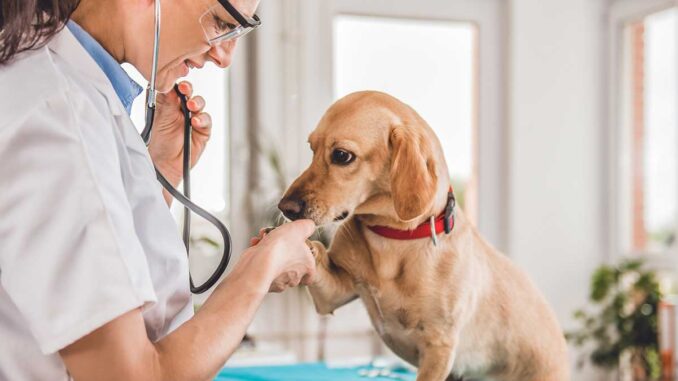
This article was updated on October 7th, 2021
Just as with people, there are many illnesses and consequences of aging that can affect our geriatric dogs. While it is important to note changes or problems in dogs of any age, it is even more important for senior dogs. With older canine citizens, a problem can often go from mild to seriously threatening quality of life in a short time.
It is very important for you to know your dog’s “normal”. While you don’t need to do things like count respirations daily – be aware of how your dog normally breathes, eats, eliminates, behaves, and moves. Many changes occur over time and so gradually that they can sneak up on you. A change is always worth noting. Doing a quick check once a week of major areas can be helpful.
Vision loss
Older dogs develop vision problems but don’t have access to eyeglasses. Many owners pick up on a “cloudiness” in their dog’s eyes. Often this is simply nuclear sclerosis. Changes in the lens of the eye lead to this hazy appearance. You may be concerned about a cataract, but nuclear sclerosis does not have any major affect on vision. Cataracts are more serious changes in the lens of the eye that become white in appearance as they grow and mature and can block vision. Surgery can restore vision to some dogs with cataracts.
Along with the change in your dog’s eye that you can see, you may notice things like your dog hesitating to go from a dark room to a light one or vice versa. He may be hesitant to go outside at night due to poor vision. Just like us, you may notice he misses a step or trips over a doorstep. Sometimes the first tip off is your dog losing track of a ball you throw.
If you notice vision problems, you can help by not rearranging the furniture, putting gates at stairways, and sometimes simply by providing more lighting for dark areas – including the yard.
Hearing loss
Hearing loss is also common. If you find your dog not responding at all when you call his name – no flick of the ear, no turn of the head – he may be losing his hearing. One of the first signs could be your dog startling when you come into a room or when you go to pet him. In some cases, a dog may even snap or actually bite. This is not intentional – he did not hear you and simply reacted.
Adjustments that can help include using a light to get his attention (clicking a flashlight on and off), trying a high pitched whistle such as the so called “silent” whistles, or banging on a pot. If your hearing loss impaired dog is sleeping, stomp on the floor as you approach so the vibrations can wake him.
Peeing inside the house
If Fido is suddenly having “accidents” in the house, there can be a number of causes. Diabetes, bladder infections, and kidney failure are both seen in older dogs. Your detective work is once again important. Is your dog drinking more than usual? With multiple dogs it can be harder to tell, but if you are filling the water bowl more frequently, then someone is drinking more. A urinalysis and a blood chemistry panel are good ways to rule out serious problems.
While it is not immediately intuitive, messes in the house are also often due to arthritis. It is harder for a dog with arthritis to getup and down the stairs, to walk over a slippery floor to the door, and even to balance to urinate or defecate.
Arthritis and joint pain
Arthritis is often overlooked for senior pets. They don’t tend to show acute pain, it gets worse gradually, and we use “age” as an excuse for why our dogs aren’t as active or don’t want to play.
Every dog can benefit from joint supplements and starting them before you see actual clinical signs is best. You can learn more about joint supplements for arthritis here. Always check with your veterinarian before adding any supplements however – too much of a good thing may be harmful, not helpful. Many senior diets now also include some joint support ingredients.
Cardiac conditions
Arthritis and joint pain may not be the only reason for your dog’s decrease in activity. Cardiac conditions can contribute to decreased stamina. If your dog is panting even at rest, or breathes hard after just a short walk, he may have an underlying heart problem. Luckily, when symptoms of canine heart disease are spotted early, they can often be treated or managed, so that Fido gets to spend more time enjoying a quality life with you.
A veterinary visit for auscultation and possibly radiographs (x-rays) or even an ultrasound and EKG may be needed to diagnose a heart problem.
Dog owners can also consider using senior diets, which often come with “built in” supplements for geriatric problems. If your dog has a chronic health problem such a heart condition or a kidney failure, it important that you keep him on a special, often prescription, diet. Luckily, many of those diets are senior appropriate as well!
Dental problems
Many senior dogs become somewhat fickle about their food. Before you start offering a smorgasbord of doggy delights to encourage appetite, make sure your dog does not have any dental problems. Tartar, plaque, and teeth with resorbed roots or abscesses can all make a dog less likely to eat. There are many, many options for dental care for dogs today. Products from the Veterinary Oral health Council have all passed extra muster. From gels to water or food additives, one of these may be able to help your dog.
Despite preventive care, your dog may need a dentistry under general anesthesia to remove diseased teeth, clean the remaining teeth, and help to establish healthy gums. With preanesthetic screening to rule out any underlying health problems, senior dogs generally handle anesthesia for a dentistry with minimal problems.
Final words: “observe, observe, observe”
The bottom line for senior dog health problems should be “observe, observe, observe”. Know your dog’s “normal” so that you pick up on changes as soon as possible. Do a quick “head to tail” assessment weekly or at a minimum monthly. Many senior dog problems can be controlled, allowing for a good quality of life, if caught early on.
Disclaimer: This website's content is not a substitute for veterinary care. Always consult with your veterinarian for healthcare decisions. Read More.


Be the first to comment